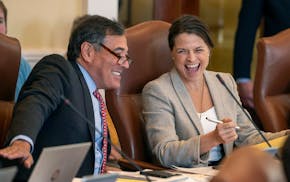WASHINGTON - Sen. Barack Obama said Tuesday that if he were elected president he would have his own version of President Bush's office of faith-based initiatives that would "help set our national agenda" and inject morality into policy debates about everything from AIDS to genocide.
But Obama's plan for a "Council for Faith-Based and Neighborhood Partnerships" departed from the Bush administration's stance on one fundamental issue: whether religious organizations that get federal funds for social services can take faith into account in their hiring. Bush has said yes. Obama said no.
"If you get a federal grant, you can't use that grant money to proselytize to the people you help and you can't discriminate against them -- or against the people you hire -- on the basis of their religion," Obama said. "Federal dollars that go directly to churches, temples, and mosques can only be used on secular programs."
He estimated the program would cost about $500 million per year. He said he would keep Bush's 11 faith-based offices and expand participation by smaller religious groups.
"The challenges we face today -- from saving our planet to ending poverty -- are simply too big for government to solve alone," Obama said outside a community center in eastern Ohio. "We need an all-hands-on-deck approach."
The prospective Democratic nominee's remarks drew much attention, as Obama again is presenting a more centrist image to voters than he did in party primary contests.
"There are some who bristle at the notion that faith has a place in the public square," Obama said. "But the fact is leaders in both parties have recognized the value of a partnership between the White House and faith-based groups."
He paired his talk about faith in the battleground state of Ohio with a speech on patriotism Monday in Missouri, another battleground for the November election.
All the while, he has been risking protests in his own party with his aggressive reach for voters who usually vote Republican.
Obama contended he is merely stating long-held positions -- surprising to some, he said, after a primary campaign in which he was "tagged as being on the left."
Obama, who has demonstrated a facility in speaking about matters of faith, is signaling he wants to make a push for support from white evangelical Protestants. That group made up about a quarter of the electorate in 2004 and voted for Bush over Sen. John Kerry by 78 percent to 21 percent.
Proposal praised
John DiIulio, a former director of Bush's faith-based program turned critic, praised Obama's proposal as "much that was best" of what Bush set out to do. "Especially in urban America, all the empirical evidence continues to show that local faith-based organizations can make a measurable civic difference," DiIulio said in a statement released by Obama's campaign.
Critics voiced two reservations: Some said that Obama's rule to ensure open hiring would discourage some organizations from participating; others said that any partnership between religion and government risked infringing on freedom of religion.
Barry W. Lynn, executive director of Americans United for Separation of Church and State, said he was disappointed by Obama's stand because Bush's program had failed and should be shut down. However, Lynn praised Obama's support for church-state separation in principle and his intention not to subsidize religious proselytizing.
Michael W. Macleod-Ball, chief legislative and policy counsel for the American Civil Liberties Union, reserved judgment but said, "We want to make sure that one religion is not favored over any other religion or over no religion. ... The more contacts you have between government and religion, the harder it is to meet that standard."
Mandates seen as trouble
Jim Towey, a former director of Bush's faith office who's now the president of Saint Vincent College in Latrobe, Pa., said he was encouraged that Obama wanted to continue the initiative. But Towey said he expected that the hiring mandates would frustrate many organizations, including black churches and evangelicals.
"The reality is an Orthodox Jewish group ceases to be Orthodox if they have to hire atheists or Southern Baptists," Towey said. "What Senator Obama is saying is groups will have to secularize if they play ball with government and receive federal funding, and that flies in the face of what many small groups want."
Obama's stand is consistent with a faith agenda that he has long advocated. In his 2006 memoir, "The Audacity of Hope," Obama wrote that he was drawn to join a black church in his 20s because of its tradition of social change and community ministry.
The New York Times and Associated Press contributed to this report.
The Latest | Jury selection enters a pivotal stretch as Trump's hush money trial resumes
Nancy Pelosi book, 'The Art of Power,' will reflect on her career in public life
Former Wisconsin Democratic Rep. Peter Barca announces new bid for Congress

